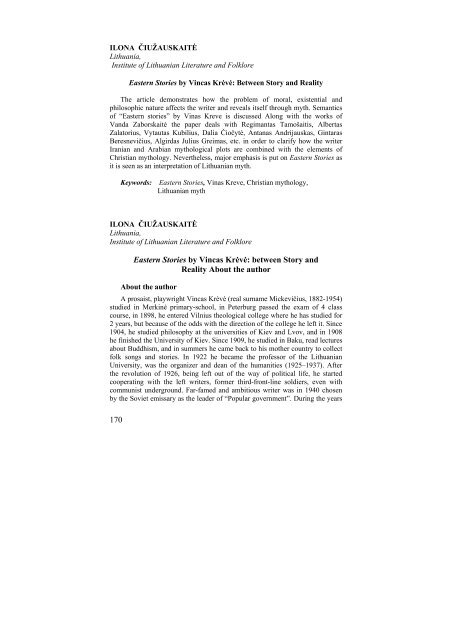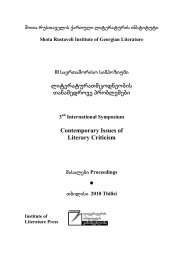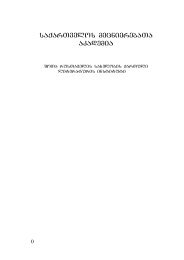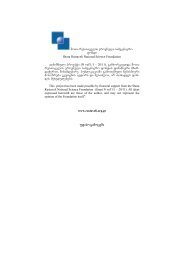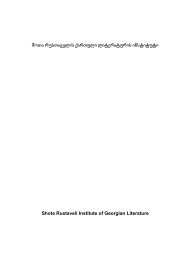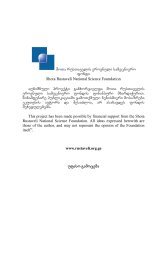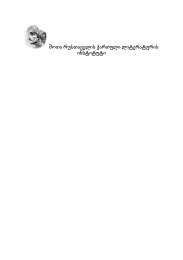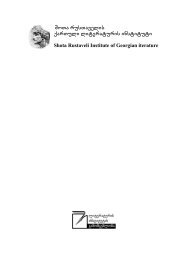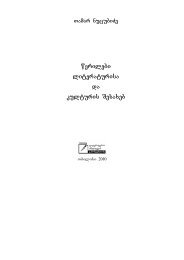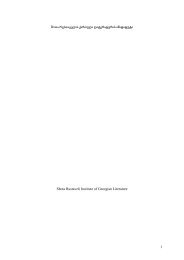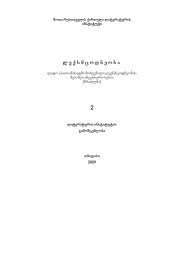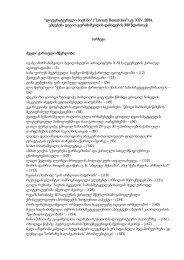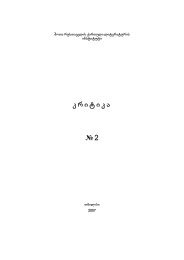- Page 1:
SoTa rusTavelis erovnuli samecniero
- Page 4 and 5:
UDC(uak)398.22+2-264](479.22)+821.3
- Page 6 and 7:
6 universaluri arqetipebi da nacion
- Page 8 and 9:
ТИГРАН СИМЯН Армен
- Page 10 and 11:
IA ZUMBULIDZE Georgia, Kutaisi Exis
- Page 12 and 13:
eliso kalandariSvili saqarTvelo, Tb
- Page 14 and 15:
14 miTi. rituali. simbolo Myth. Rit
- Page 16 and 17:
aRniSnaven, rom kosmogoniuri miTebi
- Page 18 and 19:
variantiT, carZois winaaRmdeg amxed
- Page 20 and 21:
20 muxls aravis win ar moidrekda na
- Page 22 and 23:
ven mxolod maTTvis damaxasiaTebel w
- Page 24 and 25:
iseTive funqcia aqvs osebis tradici
- Page 26 and 27:
TuTiri mglebs mbrZaneblobs, Sinaur
- Page 28 and 29:
gorc mfarvel wmindans da Suamavals
- Page 30 and 31:
Zuarebi hyavT calkeul soflebsa da o
- Page 32 and 33:
MARIA FILINA Georgia, Tbilisi Iv. J
- Page 34 and 35:
В.Стшельницкого и д
- Page 36 and 37:
36 Подстрочник: Разн
- Page 38 and 39:
Помимо того, неизве
- Page 40 and 41:
40 ЛИТЕРАТУРА: Łada-Zab
- Page 42 and 43:
чает, что «на совре
- Page 44 and 45:
стороны, «литерату
- Page 46 and 47:
рос заставлял заду
- Page 48 and 49:
себе большую худож
- Page 50 and 51:
относительно давно
- Page 52 and 53:
52 universaluri arqetipebi da nacio
- Page 54 and 55:
Вагнера, в его музы
- Page 56 and 57:
ности и все побочны
- Page 58 and 59:
Представленные выш
- Page 60 and 61:
«По морю челн, гони
- Page 62 and 63:
мифологического мы
- Page 64 and 65:
LYUDMILA BORIS Russia, Moscow Highe
- Page 66 and 67:
из двух частей: пер
- Page 68 and 69:
рождественская ска
- Page 70 and 71:
вочкам-снежинкам п
- Page 72 and 73:
чистым, кряжистым и
- Page 74 and 75:
MAKA ELBAKIDZE Georgia, Tbilisi Sho
- Page 76 and 77:
ac Seexeba istoriul wyaroebs, pirve
- Page 78 and 79:
tianed. miuxedavad amisa, swored go
- Page 80 and 81:
lia, rom kretienis mir Seqmnil artu
- Page 82 and 83:
trod~ ∗ , an: `nuTu es aris artur
- Page 84 and 85:
mocemuli epizodis ganxilvisas cxadi
- Page 86 and 87:
Seswevs Zala britaneTis dacvisa. sw
- Page 88 and 89:
mokla borotmoqmedi. raindsa da gine
- Page 90 and 91:
глубинном уровне ф
- Page 92 and 93:
der Kerzen des Kristallkronleuchter
- Page 94 and 95:
Handbewegung und richtete sich noch
- Page 96 and 97:
MILANA LAZARIDI Kyrgyzstan, Bishkek
- Page 98 and 99:
глубоко печалило е
- Page 100 and 101:
Складываются поэти
- Page 102 and 103:
102 Троянского коня
- Page 104 and 105:
Восток явственно п
- Page 106 and 107:
гедии Еврипида, где
- Page 108 and 109:
семье не помышляет
- Page 110 and 111:
перед фактом круше
- Page 112 and 113:
ЛИТЕРАТУРА: Рlatonis 193
- Page 114 and 115:
araferi rCeboda aRusrulebeli da aux
- Page 116 and 117:
ufro detalurad teqstis Sesabamisi a
- Page 118 and 119:
amis Semdeg medeas jadoqrobas evrip
- Page 120 and 121: alebeli, araadamianuri Tvisobriobis
- Page 122 and 123: NUGZAR PAPUASHVILI Georgia, Tbilisi
- Page 124 and 125: mesame pozicia dRes mkvlevrebisTvis
- Page 126 and 127: arsi, romelsac `qebaTa qeba~ gvTava
- Page 128 and 129: gil-samyofelis mosaZebnad gamosul q
- Page 130 and 131: ia. es gacxadeba man maSin miiRo, r
- Page 132 and 133: Вступая в это поле,
- Page 134 and 135: данного места, или,
- Page 136 and 137: имеется музей (ГМИИ
- Page 138 and 139: таким образом вовл
- Page 140 and 141: гого, если для выпо
- Page 142 and 143: Подобных людей, кот
- Page 144 and 145: Добавим к этому, чт
- Page 146 and 147: Братства, именно с
- Page 148 and 149: должны не только ук
- Page 150 and 151: ЛИТЕРАТУРА: Hesse 1987: H
- Page 152 and 153: erT-erTi aseTi saxea mijaWvuli / da
- Page 154 and 155: sma qvesknelSi miajaWva (zogi gadmo
- Page 156 and 157: fikam ganapiroba. misi RmerTmebrZol
- Page 158 and 159: ANASTASIYA TOPUZ Ukraine, Kiev Bory
- Page 160 and 161: Почему же предал Иу
- Page 162 and 163: восприятия» так, чт
- Page 164 and 165: 532/518-443 ww.) `sufTa (bajaRlo) o
- Page 166 and 167: gavrcelebaze miuTiTebs. amasve mogv
- Page 168 and 169: miuTiTebs. cxadia, rom maTac tyavi
- Page 172 and 173: there lie in human's nature, what l
- Page 174 and 175: In the letter of 1913 to Liudas Gir
- Page 176 and 177: miTologiuri diskursi da kulturis ti
- Page 178 and 179: approaching and which he called bei
- Page 180 and 181: history of humanity is the withdraw
- Page 182 and 183: only has to identify this law of be
- Page 184 and 185: university. Way too easily and irre
- Page 186 and 187: REFERENCES: Aleksandravičius 2010:
- Page 188 and 189: krizisi, es ar aris stilis krizisi,
- Page 190 and 191: a) RmerTis sikvdili/RirebulebaTa ga
- Page 192 and 193: magram cxadia, romanSi miTosuri sib
- Page 194 and 195: marcxma, rac amavdroulad unda gavia
- Page 196 and 197: uri warmodgenebi (ix. Tavi `konstan
- Page 198 and 199: NUGESHA GAGNIDZE Georgia, Kutaisi A
- Page 200 and 201: 1942: Nr. 215), „Iwane, der georg
- Page 202 and 203: grigol robaqiZes savaraudod gaaCnda
- Page 204 and 205: savleTis xelmwifem Seifara. roca ig
- Page 206 and 207: grigol robaqiZis literaturil zRapar
- Page 208 and 209: wyvils warmogvidgens, rac erTgvarad
- Page 210 and 211: obaqiZe 1991b: robaqiZe, grigol.
- Page 212 and 213: также и символом кр
- Page 214 and 215: Главная традиция, д
- Page 216 and 217: unda moecva. `kantoebSi~ istoriuli
- Page 218 and 219: qaosi, uformoba, biologiuri procesi
- Page 220 and 221:
valenovanebas ramdenime funqcia aqv
- Page 222 and 223:
ogorc avRniSneT, `pizis kantoebis~
- Page 224 and 225:
IA ZUMBULIDZE Georgia, Kutaisi Akak
- Page 226 and 227:
ский, А.Дзябченко, К
- Page 228 and 229:
становится образ т
- Page 230 and 231:
В рассказе Маканин
- Page 232 and 233:
ERVAND MARGARYAN Armenia, Yerevan N
- Page 234 and 235:
В эллинистическую
- Page 236 and 237:
направления Гермес
- Page 238 and 239:
Исследователи давн
- Page 240 and 241:
Очевидно, что дальн
- Page 242 and 243:
По мнению некоторы
- Page 244 and 245:
системе делало ее е
- Page 246 and 247:
Помпея и армянским
- Page 248 and 249:
ЛИТЕРАТУРА: Boak 1955: Bo
- Page 250 and 251:
Международной летн
- Page 252 and 253:
iT, miuxedavad imisa, rom `gvelismW
- Page 254 and 255:
175). grigol robaqiZis dramaSi gvxv
- Page 256 and 257:
ebis personaJebi kalasikuri miTebis
- Page 258 and 259:
elis nadiroba) miTopoeturi planis (
- Page 260 and 261:
LILIA NEMCHENKO Russia Yekaterinbur
- Page 262 and 263:
ка» (неприбранный б
- Page 264 and 265:
тает и Леван Когуаш
- Page 266 and 267:
ме себя самого, не и
- Page 268 and 269:
LARISA SANZHEEVA Russia, Buryat, Ul
- Page 270 and 271:
ществе человек реа
- Page 272 and 273:
Человек проходит п
- Page 274 and 275:
знаний, непосредст
- Page 276 and 277:
в силу присущих им
- Page 278 and 279:
ется в культуре и у
- Page 280 and 281:
связи и взаимодейс
- Page 282 and 283:
и кабального (долго
- Page 284 and 285:
в этом вопросе став
- Page 286 and 287:
Как отмечает А. Рад
- Page 288 and 289:
(Мухтаров 1969: 52). Жиз
- Page 290 and 291:
290 Время, наконец, с
- Page 292 and 293:
292 На счастье угнет
- Page 294 and 295:
NESTAN SULAVA Georgia, Tbilisi Iv.
- Page 296 and 297:
lisa da RvTaebrivis Secnobas, aqeda
- Page 298 and 299:
Tebs ufali sulierebis sawvdomad, ma
- Page 300 and 301:
i; kerZod, giorgi merCulis Txzulebi
- Page 302 and 303:
asevea wm. giorgi mTawmideli warmod
- Page 304 and 305:
samoselni da rameTu samoTxisa mkÂd
- Page 306 and 307:
on is tkiviliani saTqmeli, rac qvey
- Page 308 and 309:
is cxovrebiseuli gzebis tragikul xv
- Page 310 and 311:
oca ers danawevrebisa da daZabunebi
- Page 312 and 313:
`simarTlis gamarjvebasa mTaze arwiv
- Page 314 and 315:
lisa da zneobis normebSi ar `jdeba~
- Page 316 and 317:
jdomiT dasjis tolfardia: `dammaleT,
- Page 318 and 319:
eri da fizikuri ZalRonis maqsimalur
- Page 320 and 321:
sakiTxs SevexebiT _ rogor uyureben
- Page 322 and 323:
322 sxva sadgomebSi aseve norC cika
- Page 324 and 325:
saxeb, rac mas mianiWa am pawia Cit
- Page 326 and 327:
damowmebani: vaJa-fSavela 1961a: va
- Page 328 and 329:
ibliuri saxismetyveleba ganmsazRvre
- Page 330 and 331:
da sasufevelic TavianTi arsiT sruli
- Page 332 and 333:
sakuTari arsebis msxverplad gaRebis
- Page 334 and 335:
xilva gamocxadebis erT-erTi Sinafor
- Page 336 and 337:
es subieqtur gancdaSi moqceuli real
- Page 338 and 339:
gulis siwmindisTvis zrunvaa; es ari
- Page 340 and 341:
Sinaarsia saxecvlili. magaliTisTvis
- Page 342 and 343:
MANANA KVATAIA Georgia, Tbilisi Sho
- Page 344 and 345:
iT, aramed religiuri universalisti.
- Page 346 and 347:
cnobiereba, Cveni sxeulni. garduval
- Page 348 and 349:
materiasTan, araa logosi. sinamdvil
- Page 350 and 351:
tikosTa Secdomis saTave vaJas metyv
- Page 352 and 353:
dvile esaubreba. vaJa Tavidanve gva
- Page 354 and 355:
originaluria, SemoqmedebiTi. rac ar
- Page 356 and 357:
vaJas gzac aseTia, mindiam boroteba
- Page 358 and 359:
TEIMURAZ KURDOVANIDZE Georgia, Tbil
- Page 360 and 361:
mindiam ise igrZno Tavi, rom `aRara
- Page 362 and 363:
vaJa-fSavela mindias gmirobisa da m
- Page 364 and 365:
vaJas gansakuTrebuli funqciiT Semoh
- Page 366 and 367:
ar wyvets cremlisRvras, Tumca bolom
- Page 368 and 369:
IRMA KVELASHVILI Georgia, Tbilisi S
- Page 370 and 371:
cnen da gafrindnen. fSav-xevsureTSi
- Page 372 and 373:
372 `vnaxe, cis tatnad davatyve, mT
- Page 374 and 375:
TAMAR SHARABIDZE Georgia, Tbilisi S
- Page 376 and 377:
TviTon mkiTxavs unda, ... Seawers c
- Page 378 and 379:
aZlevs mwerali marTlmadideblobis ar
- Page 380 and 381:
gansxvavebuli da daxvewilia zogadad
- Page 382 and 383:
yma Tu ubralo adamiani, an adamianz
- Page 384 and 385:
is enis swavla da adamianis ucodvel
- Page 386 and 387:
ZaliT gamoxatavs mTeli kacobriobisa
- Page 388 and 389:
miniSneba miTSi ar xdeba da es mxol
- Page 390 and 391:
zRapruli pasaJia ojaxis wevri gamud
- Page 392 and 393:
EKA CHKHEIDZE Georgia, Tbilisi Shot
- Page 394 and 395:
394 an miwas scemda fexiTa. xmals m
- Page 396 and 397:
luri gamodga. man mxolod murmanis s
- Page 398 and 399:
nen. diumezilis azriT, marjvena mkl
- Page 400 and 401:
gavavrcob (amaze ixileT Cems miTiTe
- Page 402 and 403:
zedmiwevniT Caatara msxverplSewirvi
- Page 404 and 405:
sxva epizodSi, kerZod, aludas vizio
- Page 406 and 407:
lod cudi (sastiki) saqcieli. es ari
- Page 408 and 409:
saiqiosac igive moTxovnileba sma_Wa
- Page 410 and 411:
410 miTi. rituali. simbolo Myth. Ri
- Page 412 and 413:
as piramidis saxe aqvs, sadac ZiriT
- Page 414 and 415:
414 transcendenturi moTxovnilebebi
- Page 416 and 417:
EKATERINE KOBAKHIDZE Georgia, Tbili
- Page 418 and 419:
emaSi moyvanili miTis am versiisaTv
- Page 420 and 421:
evbeel kolonistTa meSveobiT. arqeol
- Page 422 and 423:
SesaZlebelia isic, rom damwerlobis
- Page 424 and 425:
1. kunZul lemnosze, romelic qalkidu
- Page 426 and 427:
Tukididesi 1920: Thucydides. vol. I
- Page 428 and 429:
personificirebuli RmerTebi homerosi
- Page 430 and 431:
(es kargad warmoCndeba krebaze maTi
- Page 432 and 433:
deg, rodesac isev deda mouwodebs, u
- Page 434 and 435:
isxva, romelsac mtris javri aRZravs
- Page 436 and 437:
piesaSi warmoCenilia javris gamanad
- Page 438 and 439:
_ rjuli kaciskvlis nebas ar gvaZlev
- Page 440 and 441:
INGA SANIKIDZE Tbilisi, Georgia Iv.
- Page 442 and 443:
i pasuxi gavceT niko maris sagulisx
- Page 444 and 445:
ase xom ar aris `vefxistyaosniseuli
- Page 446 and 447:
vneli morfologiuri niSania (iv. jav
- Page 448 and 449:
i > cv-ar-i (*ciuri nami), cu-en-a
- Page 450 and 451:
MARINE TURASHVILI Georgia, Tbilisi
- Page 452 and 453:
uli prozis iseTive Janria, rogorc g
- Page 454 and 455:
sxva variantis mixedviT mTqmeli Win
- Page 456 and 457:
`wiqvilSi iyo erTi qali. erTxel Ram
- Page 458:
orbeliani 1993: orbeliani s.-s. `Wi


